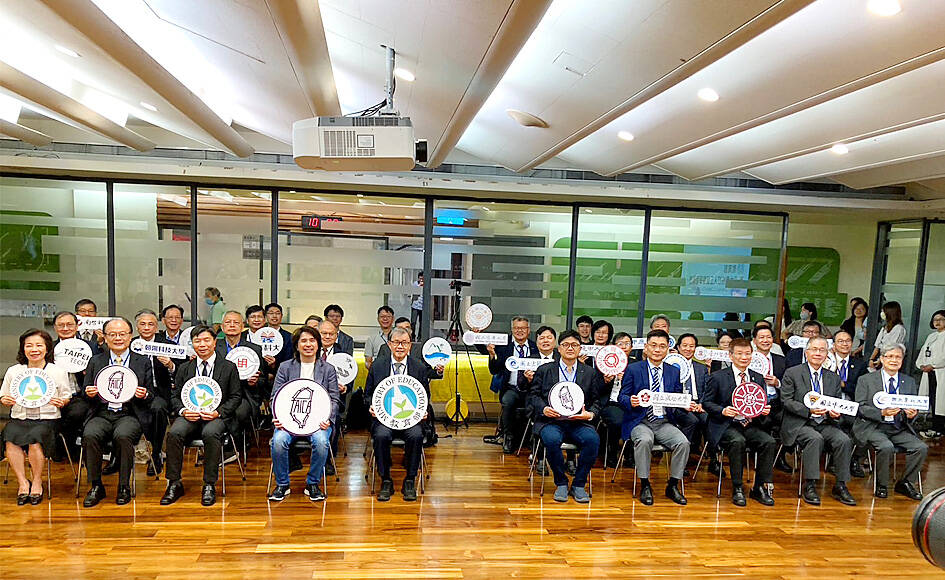Minister of Education Cheng Ying-yao (鄭英耀), along with representatives of 25 universities, yesterday announced the establishment of the Taiwan Artificial Intelligence College Alliance to enable students to take intercollegiate courses on artificial intelligence (AI) and obtain certificates.
The alliance, which begins official operations in the academic year starting this month, aims to prepare more than 10,000 students with AI-related expertise in the next three years, Cheng said.
In response to an urgent demand for AI talent in Taiwan’s technology industry, universities should have AI-related undergraduate courses, Cheng said, adding that the strategy must move from competition between universities, to intercollegiate cooperation and the forming of a “Team Taiwan.”

.Photo: Rachel Lin, Taipei Times
The alliance is led by the Ministry of Education and several universities, with National Taiwan University, National Tsing Hua University and National Cheng Kung University as the main institutions participating in the initial stage, while other universities would have an opportunity to join later, he said.
With the alliance’s launch, AI learning resources would be popularized in universities across the nation, and if students from other countries in the region want to learn about AI, Taiwan would be the best destination for them, Deputy Minister of Education Yeh Ping-cheng (葉丙成) said.
Based on the idea of “it takes a village to raise a child,” the ministry spent two months coordinating with top AI academics to overcome initial difficulties, Yeh said.
Students who complete the required courses would receive a program certificate from the ministry, he added.
“Industries can look for this certificate when they recruit AI talent,” he said.
The alliance plans to open four programs: AI exploration and application, AI industrial application, AI and natural language processing, and AI and visual technology application, Yeh said.
Each program would have five required courses, totaling 15 credits, and the maximum number of students for each course is set at 1,500, which could increase as more universities join the alliance, he said.
The alliance would have leading courses, satellite courses and regular courses, provided through an online digital learning platform, and students can interact with course instructors if they take the course synchronously, or with teaching assistants if they take them asynchronously, he said.
IBM Consulting, Taiwan manager Han Lin (林翰則) said the industry has a positive attitude about the alliance, and supports its establishment.
The alliance can integrate AI educational resources from universities across the nation to cultivate talent to meet a shortage of workers with AI specializations, he said.
IBM Consulting, Taiwan students who obtained the alliance’s certificate would be seen as having expertise in AI, so the company would consider recruiting them first, Lin said.

Conflict with Taiwan could leave China with “massive economic disruption, catastrophic military losses, significant social unrest, and devastating sanctions,” a US think tank said in a report released on Monday. The German Marshall Fund released a report titled If China Attacks Taiwan: The Consequences for China of “Minor Conflict” and “Major War” Scenarios. The report details the “massive” economic, military, social and international costs to China in the event of a minor conflict or major war with Taiwan, estimating that the Chinese People’s Liberation Army (PLA) could sustain losses of more than half of its active-duty ground forces, including 100,000 troops. Understanding Chinese

The Ministry of Foreign Affairs (MOFA) yesterday said it is closely monitoring developments in Venezuela, and would continue to cooperate with democratic allies and work together for regional and global security, stability, and prosperity. The remarks came after the US on Saturday launched a series of airstrikes in Venezuela and kidnapped Venezuelan President Nicolas Maduro, who was later flown to New York along with his wife. The pair face US charges related to drug trafficking and alleged cooperation with gangs designated as terrorist organizations. Maduro has denied the allegations. The ministry said that it is closely monitoring the political and economic situation

UNRELENTING: China attempted cyberattacks on Taiwan’s critical infrastructure 2.63 million times per day last year, up from 1.23 million in 2023, the NSB said China’s cyberarmy has long engaged in cyberattacks against Taiwan’s critical infrastructure, employing diverse and evolving tactics, the National Security Bureau (NSB) said yesterday, adding that cyberattacks on critical energy infrastructure last year increased 10-fold compared with the previous year. The NSB yesterday released a report titled Analysis on China’s Cyber Threats to Taiwan’s Critical Infrastructure in 2025, outlining the number of cyberattacks, major tactics and hacker groups. Taiwan’s national intelligence community identified a large number of cybersecurity incidents last year, the bureau said in a statement. China’s cyberarmy last year launched an average of 2.63 million intrusion attempts per day targeting Taiwan’s critical

AGING: As of last month, people aged 65 or older accounted for 20.06 percent of the total population and the number of couples who got married fell by 18,685 from 2024 Taiwan has surpassed South Korea as the country least willing to have children, with an annual crude birthrate of 4.62 per 1,000 people, Ministry of the Interior data showed yesterday. The nation was previously ranked the second-lowest country in terms of total fertility rate, or the average number of children a woman has in her lifetime. However, South Korea’s fertility rate began to recover from 2023, with total fertility rate rising from 0.72 and estimated to reach 0.82 to 0.85 by last year, and the crude birthrate projected at 6.7 per 1,000 people. Japan’s crude birthrate was projected to fall below six,